Come see how butcher block countertops can invite warmth and function into your home. With proper care, they can be a beautiful addition to your home for years to come.
You might be considering them, but wondering if they’re a good idea. Are they safe for food? Will they hold up to water?
Butcher block countertops can do it all, adding a rich, elegant wood tone for ambience and classic style. Learn more in this complete guide!
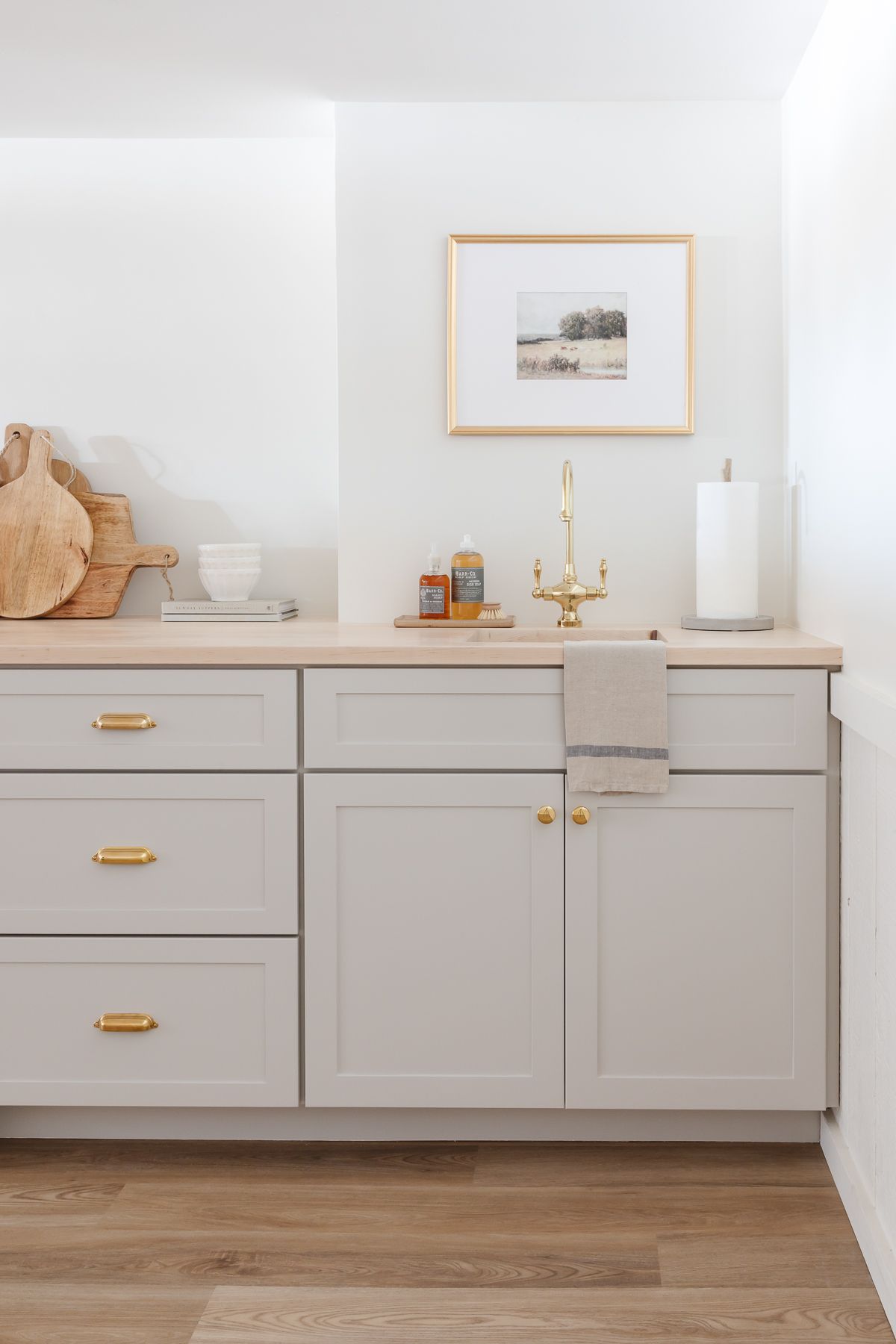
You know me, I love to make homes feel warm and cozy, and butcher block is a perfect way to do it! In our recently finished basement bar, we decided to add warmth and a soft, light finish with these beautiful countertops.
Butcher block isn’t just for one design aesthetic, either. Yes, it fits with traditional and farmhouse style. But even modern style can use the warmth of wood and still feel sleek.
If you’d like to read about other types of countertop materials, here’s why I love danby marble, alternatives to marble, and all about quartz countertops.
We also discuss other materials, including laminate, solid surface, and concrete in this post about styles of countertop edges.
Use the drop down Table of Contents menu to navigate this post, and don’t forget to pin it and save for later!
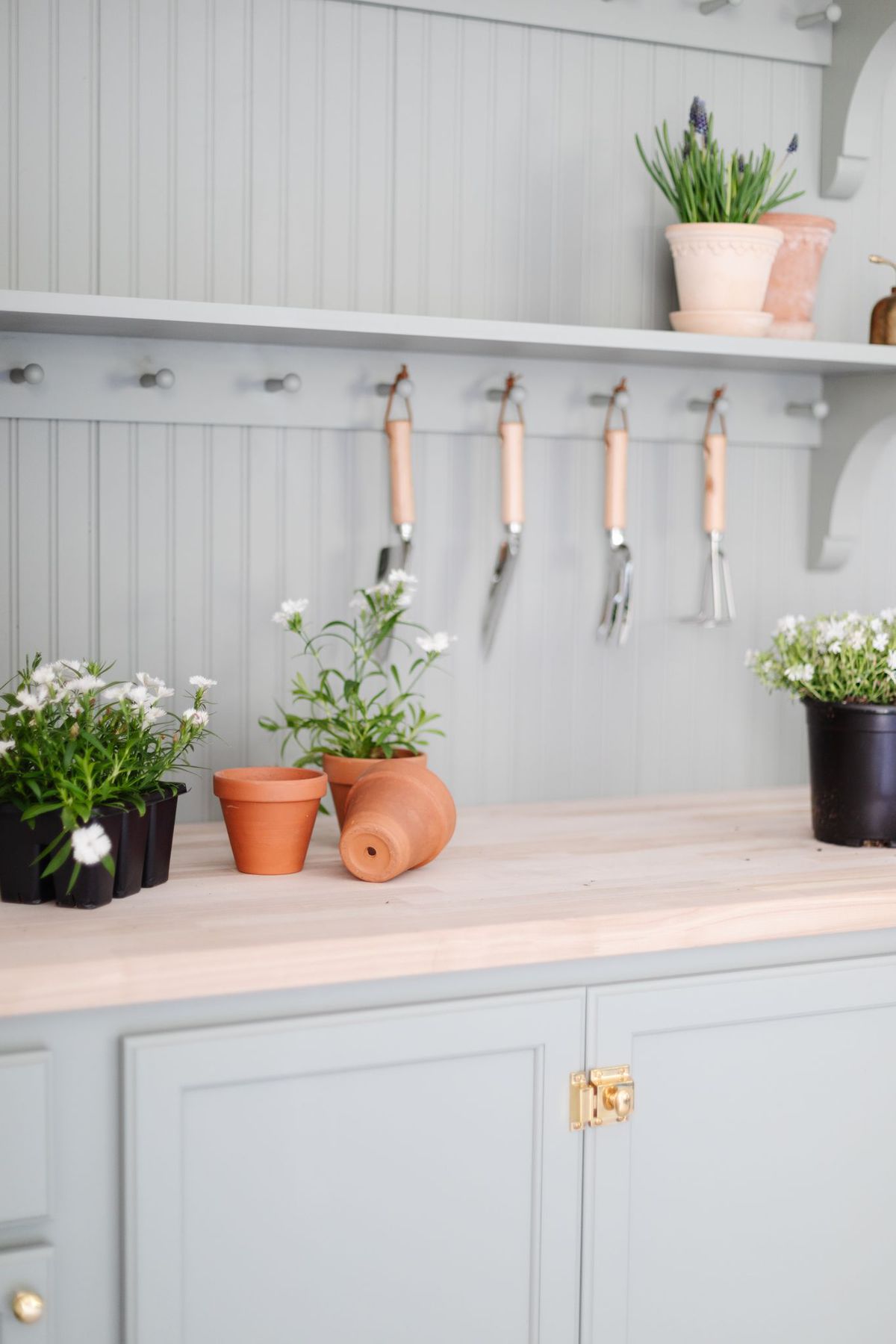
What Is Butcher Block?
Butcher block, also called butcher’s block, is a wood surface that is made of narrow strips of wood glued together and sanded to create one thick, smooth slab. It is a durable countertop material, as well as an attractive one.
Often when people refer to wood countertops, they’re really talking about butcher block. Many wood countertops are maple, although oak, walnut, cherry, hickory, and teak are other popular options.
You can stain butcher block countertops to any color you like, or you can simply seal them their natural color.
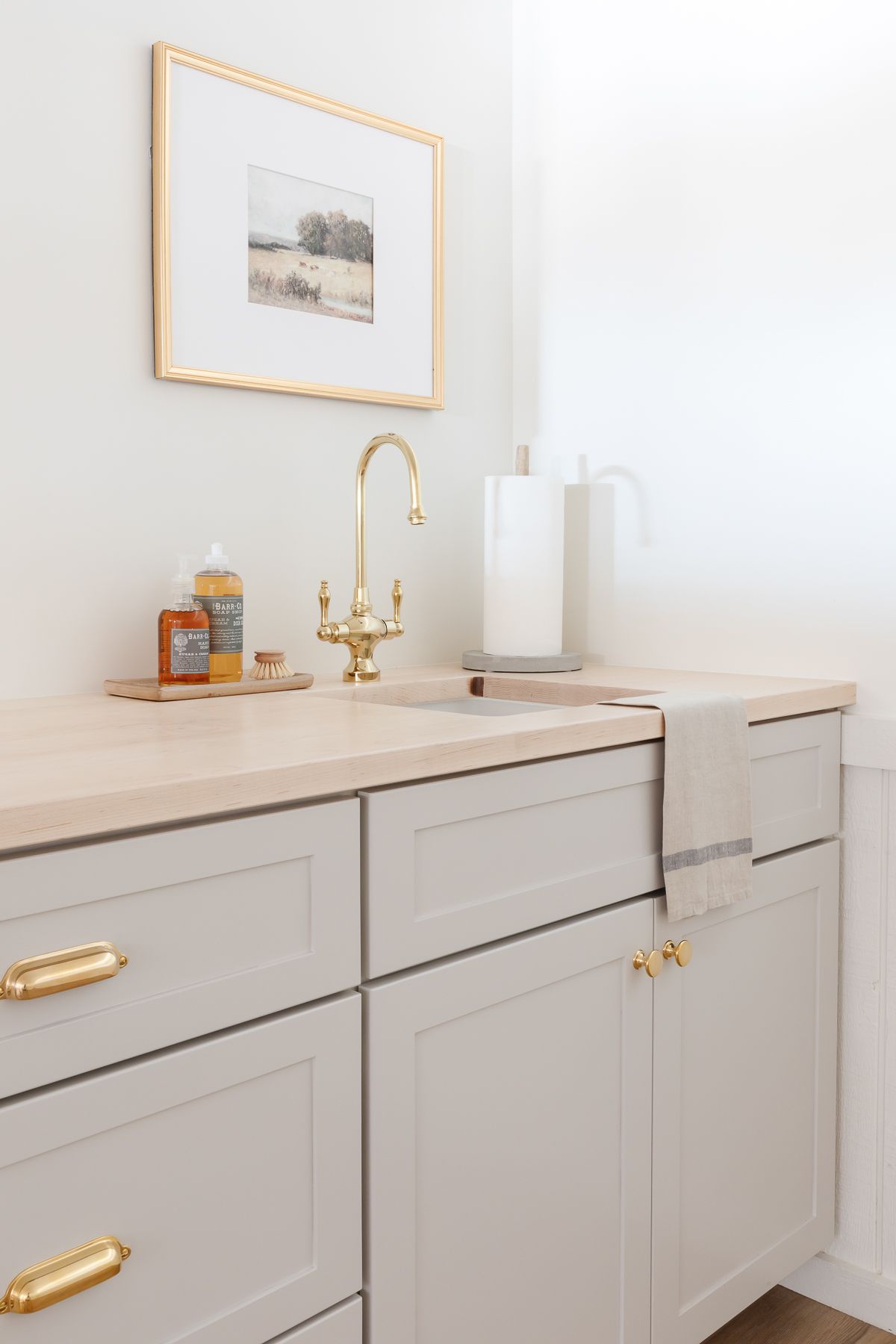
Frequently Asked Questions
No, hot pots and pans can burn wood counters and even cause it to crack. It’s best to use a trivet or hot pad to protect the surface from heat.
Butcher block counters are sanitary once they are properly sealed. If left unsealed, they will absorb germs and bacteria and will be unsafe for food preparation. Properly sealed, they are perfectly safe and sanitary for food prep. They do need to be resealed regularly.
Butcher block can be made from maple, oak, cherry, hickory, teak, bamboo, at more. At a significantly higher cost, you can pay a craftsman to make butcherblock from virtually any wood.
Butcher block is an affordable countertop option, with the countertops themselves ranging from $23-$60 per square foot. Installation, of course, will be an additional fee.
Pros and Cons of Butcher Block Countertops
Pros
- Adds warmth – The wood tones of butcher block add a cozy look to any space.
- Easy to customize – Choose the type of wood, color, and finish you want.
- Can be refinished – You can sand down your finish and change your stain color to match your new design.
- Low cost – Compared to other countertop options, butcher block costs less per square foot.
- DIY installation – Experienced DIYers can install wood countertops themselves. Pro installation also costs less than other alternatives.
- Easy to clean – Daily cleaning is easy with a damp clean and dish soap. It doesn’t require any fancy or expensive cleaners.
- Long lifespan – With proper care, butcher block counters can last up to 20 years. Laminate countertops typically need to be replaced between 10 and 15 years.
Cons
- Not waterproof – Butcher block is very sensitive to water. They can be installed around a sink if they are sealed very well, re-sealed monthly, and dried right away when they become wet. Butcher block countertops can are not recommended for bathrooms because of the exposure to moisture.
- Dent easily – Wood is naturally soft, so it isn’t a surprise that butcher block countertops can become dinged, dented, and scratched. Embrace this look, and be sure to use a cutting board when using a knife.
- Can burn – The same tip applies when handling hot pots and pans. They can burn and even crack wood counters, so it’s best to use a trivet or hot pad underneath to protect the surface.
- Can expand and contract – Just like wood floors, butcher block can expand in warm temperatures and contract when it’s cool. In extreme temperatures, they can warp or even crack.
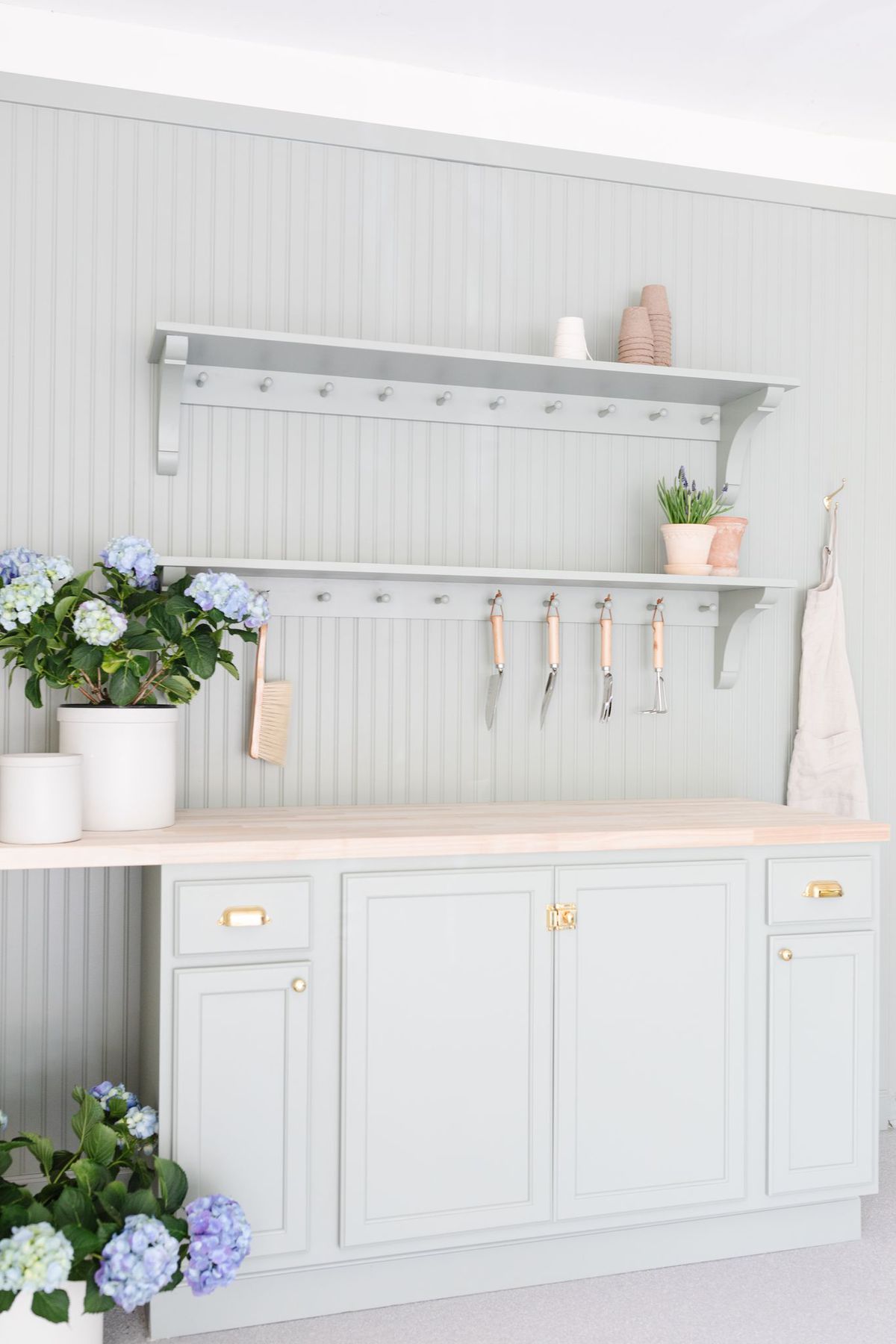
Where to Use Butcher Block Countertops
While it isn’t recommended for use in bathrooms because it isn’t the most moisture-resistant option, there are so many ways to use butcher block.
- Kitchen Countertops and Kitchen Island
- Laundry room
- Built-in bookshelves
- Built-in bar
- Office desk or craft table
- Potting Bench
- Cutting boards
Butcher Block Stain
How do you finish them? You can stain them, seal with polyurethane, choose a matte or glossy finish, or simply condition with mineral oil.
Finishing with mineral oil requires the most upkeep, since you’ll need to reapply monthly as the wood dries out. However, it’s also the easiest to do, since you don’t need to sand anything down to refinish the surface.
In the end, it comes down to what you want, how you plan to use your surface, and how much work you’re willing to put into maintaining your countertops.
If you’ll be staining, remember to sample a small section first, because woods handle stains and colors differently. See our favorite stain and sealant option in the sources section at the end of this post.
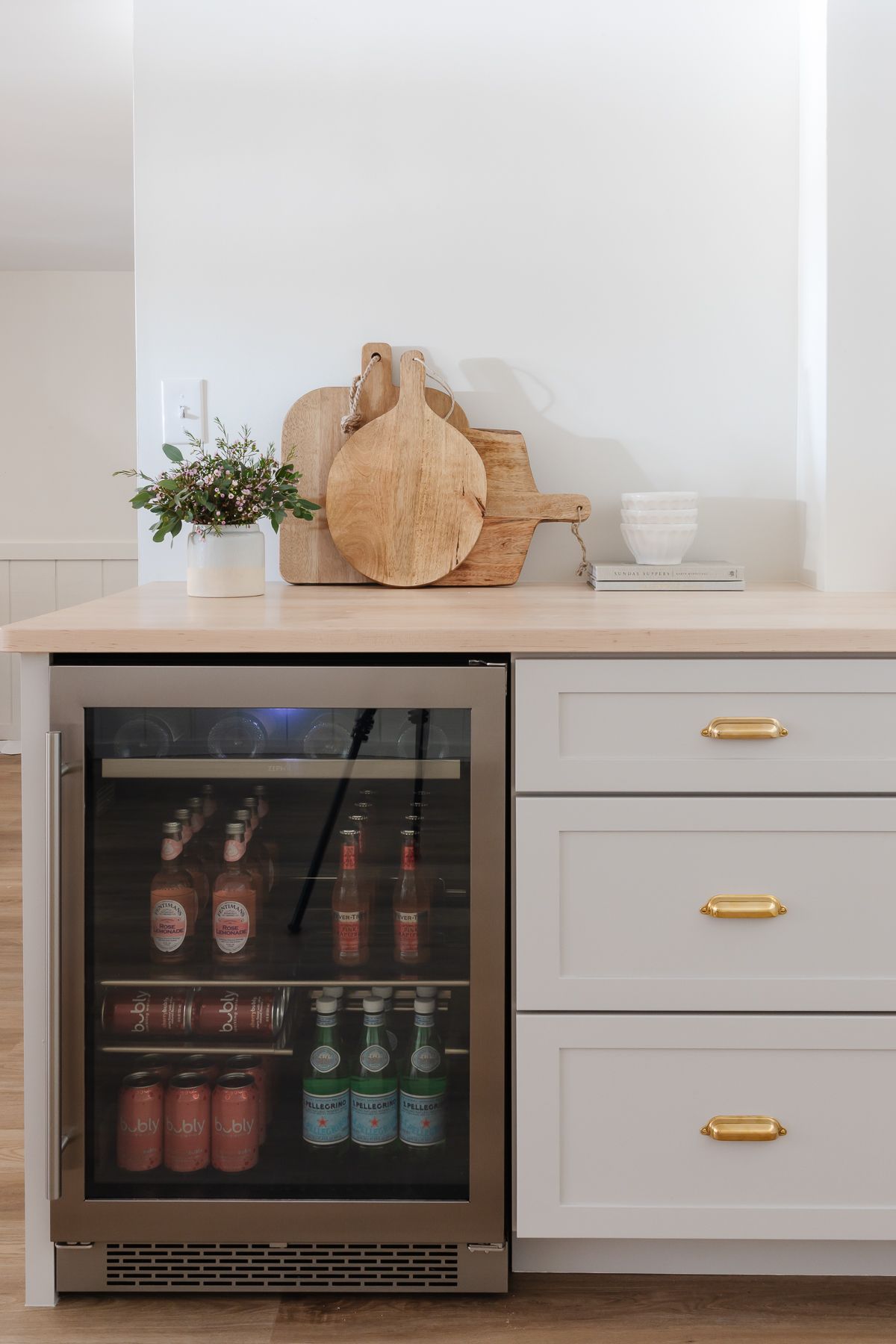
How to Maintain Wood Countertops
Butcher block has a reputation for being high maintenance – don’t let that deter you. With the proper care, your butcher block countertops can stay beautiful for years to come.
Daily Care
- Wood is absorbent and can stain, so it’s important to take care of small mishaps in a timely manner.
- You can use a nylon scraper to lightly scrape the surface free from anything that has dried in place. To wipe the surface, use a cloth dampened with water and mild dishwashing soap.
- Remember to never saturate wood countertops with water. If they do become overly wet, make sure to dry them completely as soon as possible.
Removing Stains
- For fresh stains, try sprinkling them with baking soda. Rub it in then leave it to absorb the stain for a few minutes. Dampen a cloth or sponge with mild dish soap or undiluted vinegar, and use it to scrub at the stain.
- Or, sprinkle some coarse salt on the stain, then rub it with half a lemon. The stain may disappear completely, but if it doesn’t you can leave it for a couple of days, then try going over it with dish soap or vinegar.
Butcher block can also be sanded lightly with a high-grit sandpaper to remove stains.
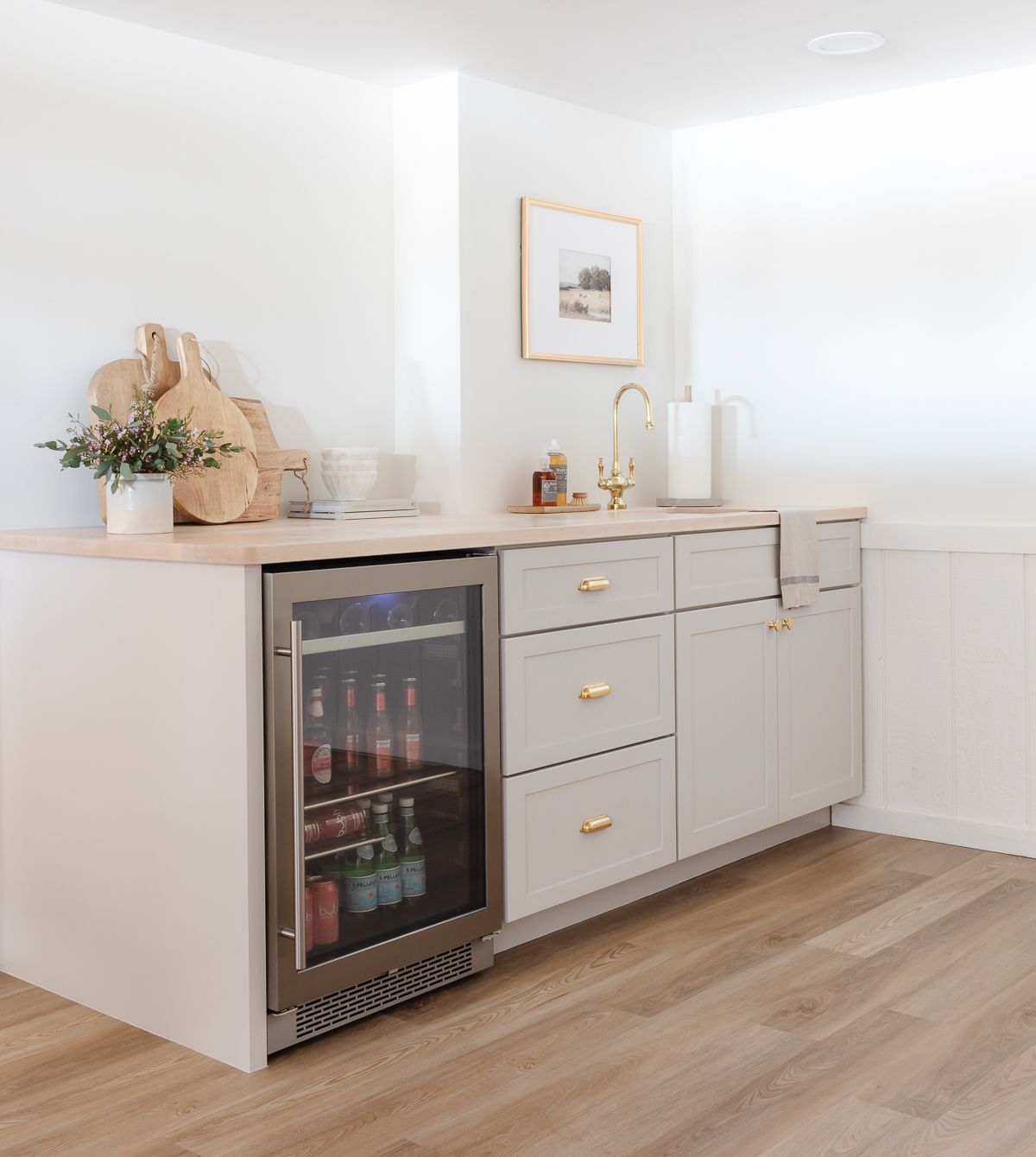
Sources
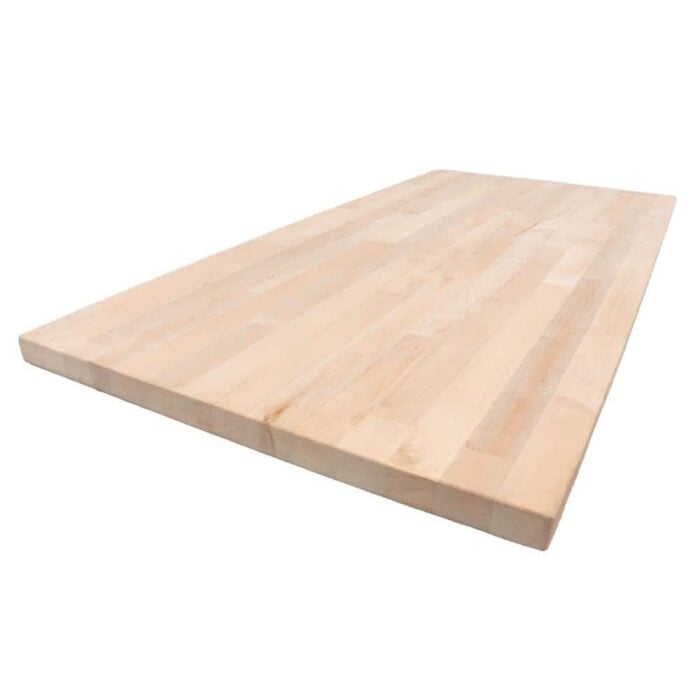
50 in. L x 25 in. D $209 (As seen throughout this post in our garage potting bench)
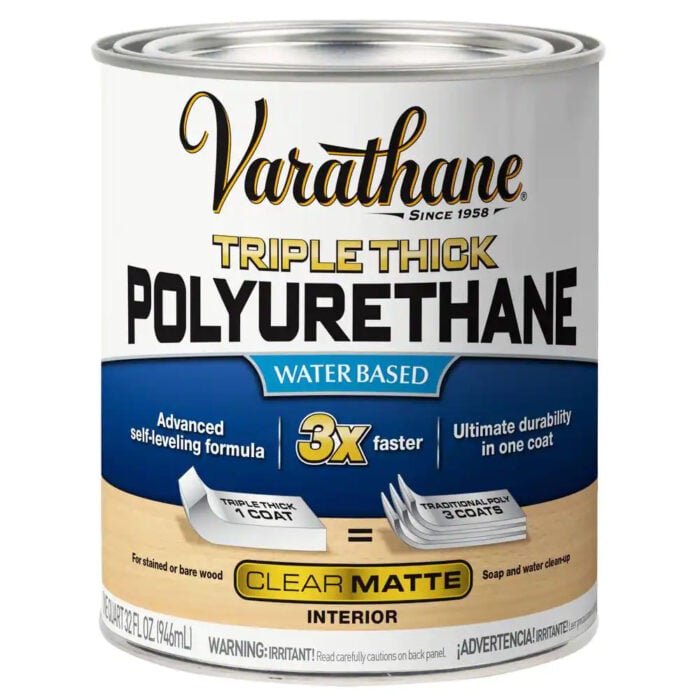
This is the product we chose to seal our butcher block. It did not change the color, but it does change the sheen.
This brand carries a popular butcher block stain in many colors – we didn’t use it as we wanted a natural finish, but it’s a great option if you’d like to darken your countertops.
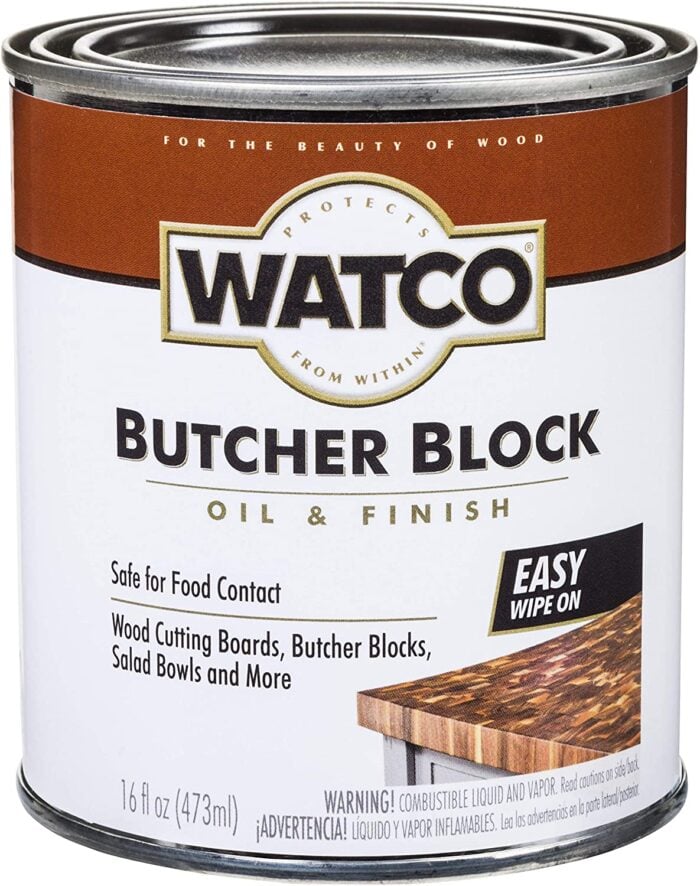
Join Our Community
Let’s keep in touch! Receive exclusive content, including never-seen-before photos, our favorite home decor DIYs and more!
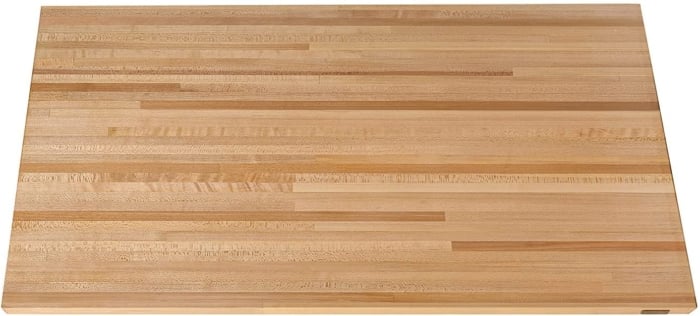
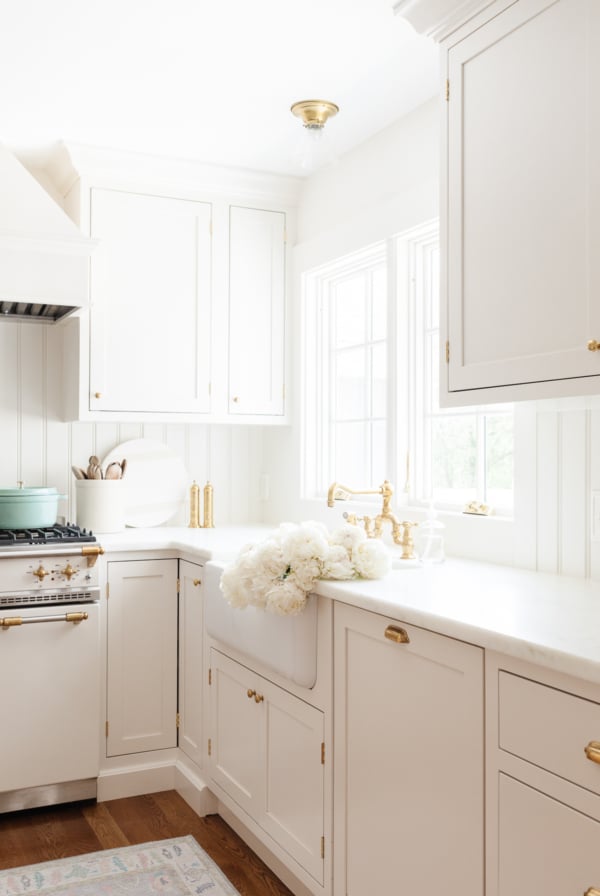
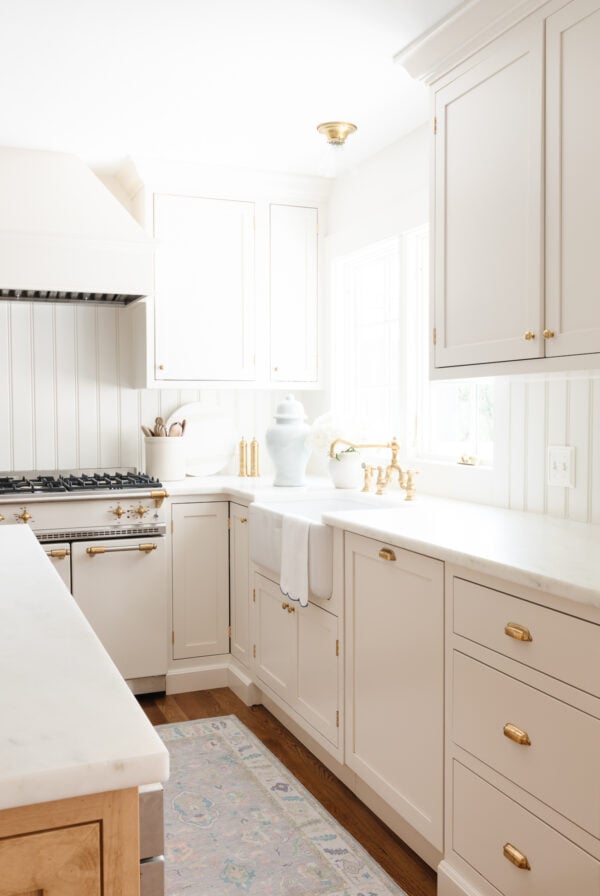
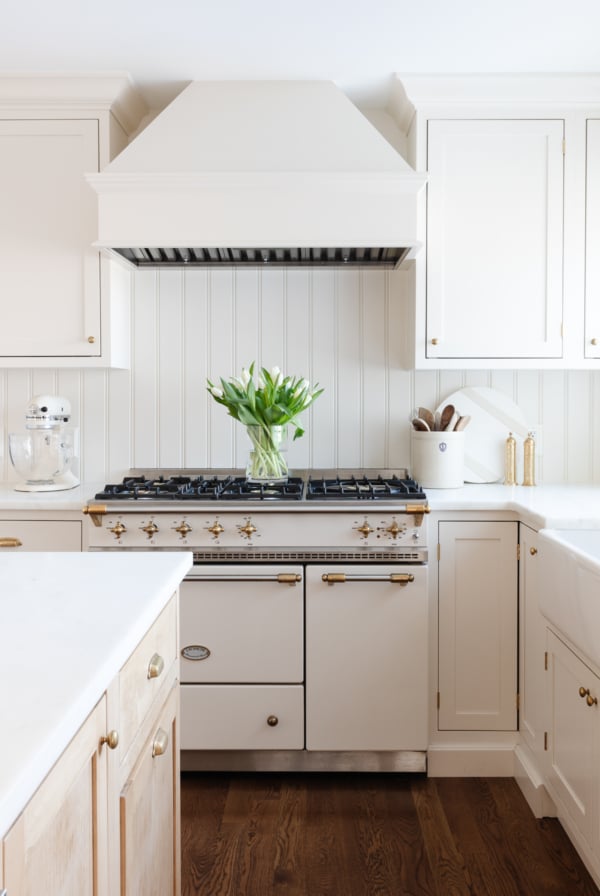
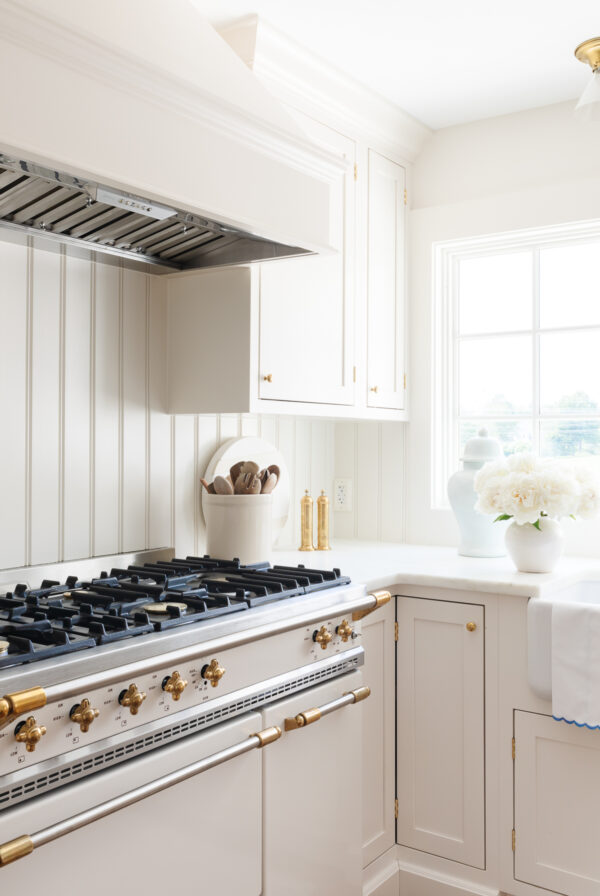
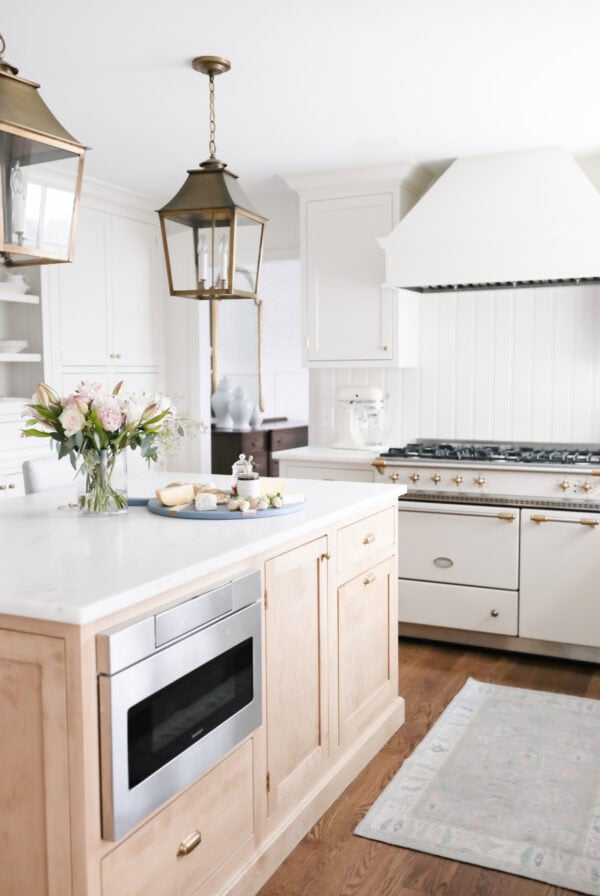
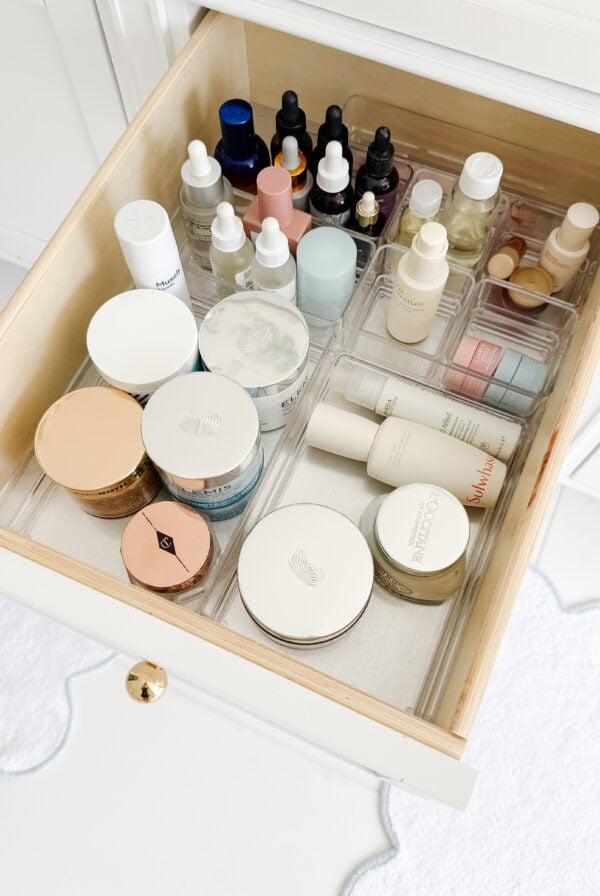
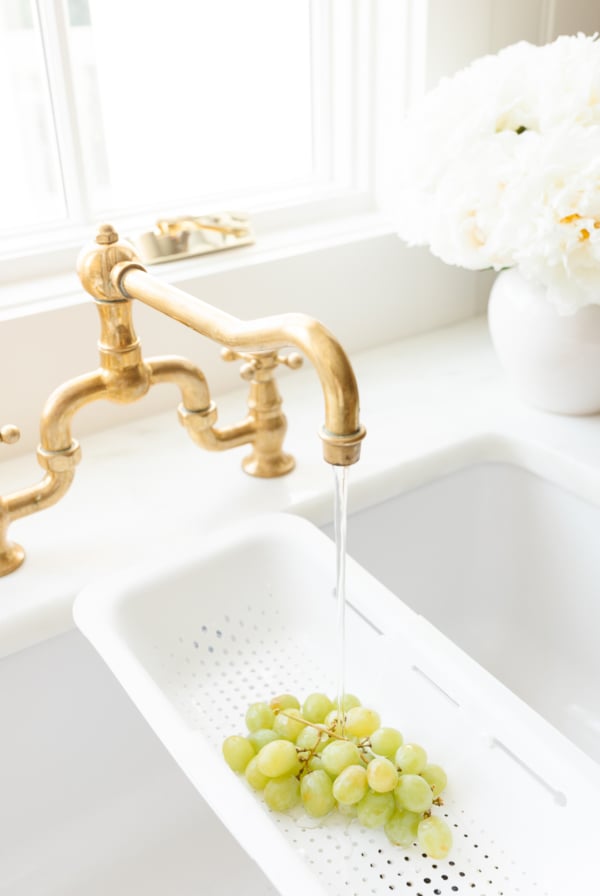






Hi! what color are the cabinets from your basement? They look beautiful with the butcher block!
Hello,
Those Cabinets are painted Sherwin Williams Agreeable Gray.
I hope that helps, enjoy!
Julie
Hi, two wood species were linked in the post. Did you purchase the maple or birch for this room? I have a gold faucet and am worried about clashing tones so would like to get it as light as possible. Please let me know if you get the chance! I’d be really grateful. Just terrible with design haha and this is exactly the look I’d like to achieve!
Hi Stephanie,
The butcher block in the garage is the Home Depot birch one that’s linked in the post. The basement one was custom made because we had that bump out in the wall there. Honestly, the color is the same for both- the only difference I can tell is the cost!
Hope that helps,
Julie
Thank you so much! I am installing a butcher block in a motor home and am worried about the wear and tear on the polyurethane instead of using mineral oil. I read your very detailed and helpful blog post about applying and taking care of the polyurethane so I’m debating it! Just been trying to find a wood species I can achieve a light enough color like this even with min oil. I have a gold sink and am worried about clashing tones 🤨🤨 thank you so much for getting back to my comment!
Can you tell me what finish you used on these to make them so light?
Hi April,
We bought the countertops in this color – they are the ones that are linked! However, we did seal them with this product. It didn’t change the color but it did give them a different sheen!
Hope that helps,
Julie